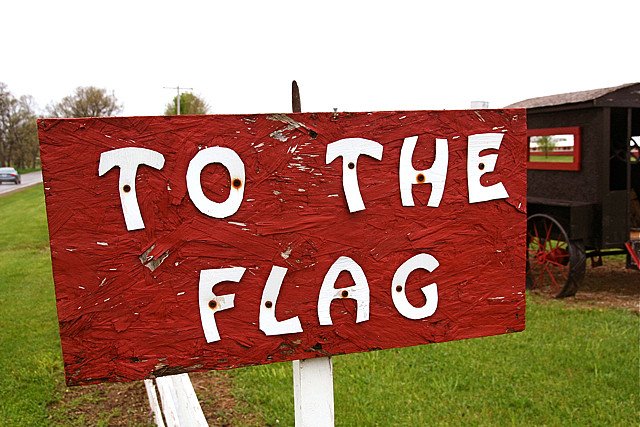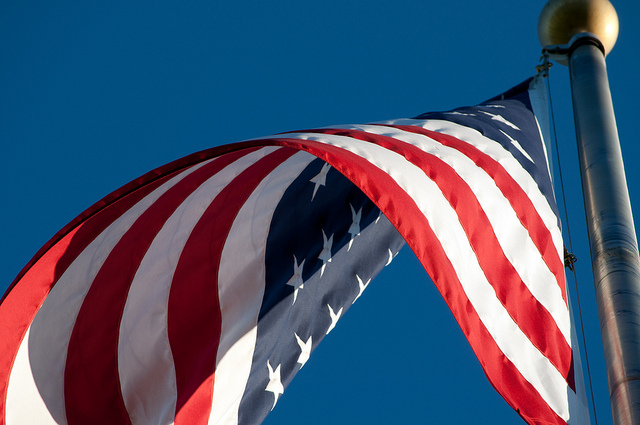Warning: f-bomb ahead.
“I am offended that you won’t say the Pledge of Allegiance,” she said tersely. “I have family members in the military, and they fight for your right not to say it. Yet, if offends me that you won’t.”
That sent me off into my own thoughts for a while. What am I missing here?
I’ve explained to those who care that I just find no value in reciting the Pledge of Allegiance. I explained my reasons: anything from “I just don’t believe in God the way those who inserted the word in the Pledge do” to “I’d rather live a pledge than recite it.”
After careful consideration, I can say that I stand my ground.
First, I don’t find any value pledging anything to inanimate objects (not that I like pledging anything to animate objects either). How can I pledge allegiance to a colorful piece of fabric? Does the flag give me orders, or demand my attendance, or require my affection? Does it create art, bring me to ecstasy, or cause me to swoon with delight? What about it am I pledging my allegiance to?
And what is allegiance anyway?
al·le·giance
əˈlējəns/noun
1. loyalty or commitment of a subordinate to a superior or of an individual to a group or cause.
It dawned on me a long time ago that this is the reverse of the principals our nation was founded on. It is not superior to me, the subordinate, but the other way around. So, politicians should be saying the pledge, military personnel should be reciting it, law enforcement and other public servant should start their shifts saying it, but ordinary citizens should be the ones receiving it.
I am not a subordinate of the ideals or Constitution this nation is founded on, those things are subordinate to me. Since I am not specifically pledging obeisance in our current pledge of allegiance (not to the rule of law, or ethics or anything else), I have to assume I am pledging my loyalty and commitment to something else. But to what?
To the republic? No, because I am the republic. The reason I am not subordinate to the republic is found in the very definition of it. For that, I will allow you to do the research.
Am I pledging allegiance to one nation under God? Well, no.
First, I don’t buy the “God” that was craftily inserted into the pledge in the 1950’s in order to use that word as a propaganda tool against Communism. I couldn’t imagine the God of the Universe looking down at one spec of dirt as necessarily more worthy, particularly one with the history ours has.
No, I don’t know that we are “under God” at all.
In fact, I’m starting to doubt that the God mentioned in the pledge and on our currency is, well, the currency itself. So, if the words “under God” were changed to “under the Almighty Dollar”, it may actually have some credibility.
One Nation? I don’t think we have been “one nation” since we invaded Vietnam because the South’s fall would ruin the world as we know it.
Or maybe it was Watergate. Or the Civil war. Or the war of 1812. Or when Texians joined the US. Or maybe even since the Trail of Tears. I’m not sure when it started, but this nation is hardly a united one. Wait, maybe that false sense of unity fell with the God we seem to worship no longer was backed by the Gold Standard.
God is now worth about 30 cents on the dollar, or something like that. All I know is that the Canadian version of God seems to be much more valuable (and isn’t owned by the Chinese).
Maybe if we actually were united by the God of the Christian bible (or at least his son), some of us wouldn’t be so happy when public assistance programs are cut, forcing kids to go hungry. Maybe if that God united us, 99 percent of us wouldn’t be working so damn hard to support the other one percent who are so afraid of everything they hire on-duty cops to protect them.
Maybe if the Jesus of the Bible was our leader, the Tea Party would still be something only little girls did in their room with all their stuffed animal friends. Okay, I admit it—I’ve been invited to a few, but they seem much more happy than the one currently screwing up our legislative system.
But we aren’t, so one just has to shake one’s head and refuse to play in the fantasy land created for us. For many, that fantasy starts with the Pledge of Allegiance, a pledge necessary for enrollment.
What about this “liberty and justice for all” stuff?
Man, would I love to pledge allegiance to something that actually did that.
Instead, I pay more taxes with my paltry salary than the wealthiest in my “one nation, under God” pays. Instead my society is the most incarcerated society on the planet, with the darkest among us bearing the weight of prison life in a far greater way than us light-skinned Americans do. Instead we are killing the hopefully-guilty, trying to tell women what to do with their bodies and imprisoning people for simply trying to find some “pursuit of happiness” in a bong or blunt.
So, I ask you, where the fuck is my liberty and justice?
Now, before you slightly-bent-to-the-right folks start throwing eggs at me because I’ve offended the sensitivities your parents got you, let me explain a few things.
I love the honorable men and women who serve us in the Armed Forces. I love them so much I detest seeing their lives taken for granted, fighting wars they should not be fighting. I support them when they come home, often through charity and deed. I don’t wave a flag at a parade they are marching in and then forget them when they come home injured, tortured, or both. In fact, my love of them is so deep I’d do the opposite. I’d forget the flag waving and dedicate that time to helping those who have paid a price in service.
And I love them so much that I’d like to see defense contractors get less of my tax dollar (and make less profit) so that they could get paid more. I happen to believe my priorities are in order.
Also, I don’t hate my country. I love this place, although I do think the idea of “country” is antiquated and obsolete. Yet, as long as humanity needs to define and divide itself, I will admit to being particularly happy to be here. Why?
Well, one reason is that we are supposed to have the power to change things, a power most of us have largely forgotten (although I understand why). We supposedly have the ability to change the way our government behaves, the way our society operates, and the very direction our nation is heading.
That fact is why I have a love/hate relationships with American history. We aren’t truly a peaceful people if history is any indicator. I’d say we’ve committed more genocide, supported more tyranny and wreaked more havoc in the world than any other nation calling Earth “home.”
We believe we are the “wealthiest,” yet I’d suggest anyone who knows how to tell the difference between assets and liabilities would suggest there is anything wealthy about us.
We forget our own history, from the subjection and murder of indigenous North American peoples, to the dark ages of the industrial revolution, to the horrendous human-rights violations of the 20th and early 21st centuries. We forget who we are sometimes, and as a result relive the outlandish mistakes of our past over and over again.
Yet, as I look at our history, I love it too.
The atrocity of slavery was reversed. Women’s suffrage began the track of women as equals in our society, a track we are still on and still struggling to achieve. Racism and bigotry were overcome in the 1950’s, and our population rose up in the 1960’s to end a war that was atrocious at worst, unnecessary at best. We’ve overcome a lot in our brief history, and that is why I believe there is nothing we cannot achieve if the will is there.
That ability is what I love about my country. It also why I can’t say the Pledge of Allegiance without it being altered to better reflect the ideals we should all be striving to achieve.
Maybe something like, “I pledge allegiance to the ideal of liberty and justice for all” would work.
Short, sweet, and to the point.
Love elephant and want to go steady?
Sign up for our (curated) daily and weekly newsletters!
Editor: Catherine Monkman













Read 5 comments and reply